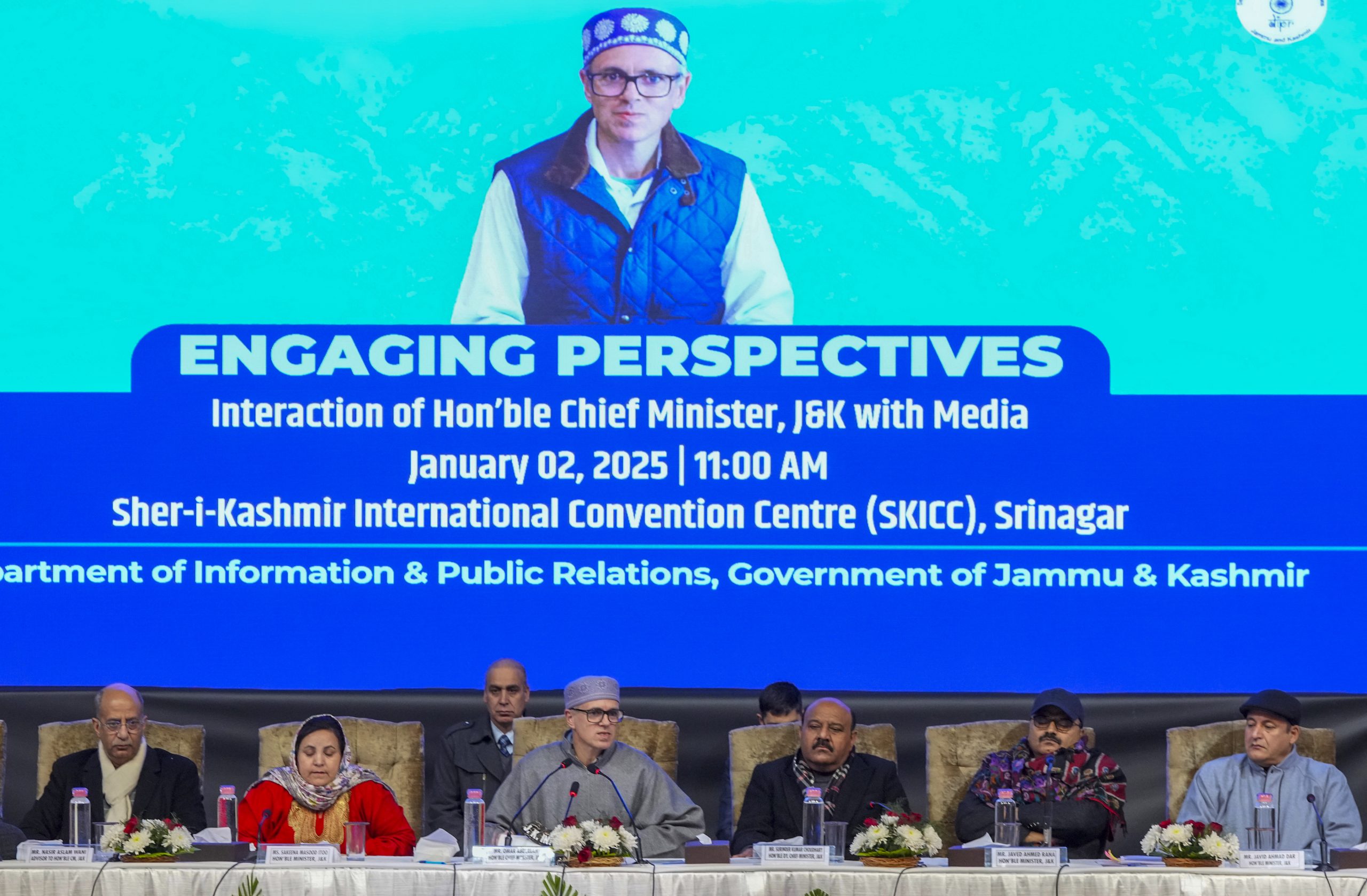Srinagar, Jan 2: Chief Minister Omar Abdullah firmly rejected assertions that his National Conference party is facing pressure to ally with the BJP-led NDA. He expressed confidence in the Centre’s commitments to promptly restore statehood to Jammu and Kashmir.
In his first media briefing since taking office in October, Abdullah stressed that the region’s current designation as a Union Territory is merely temporary and that regaining statehood represents a significant challenge for his administration.
Addressing allegations of influence from the BJP-led National Democratic Alliance (NDA) over the National Conference’s principles, he remarked, “There is no pressure from Prime Minister Narendra Modi, Home Minister Amit Shah, or the Raj Bhawan for us to alter our ideology.”
Abdullah mentioned receiving assurances from both the Prime Minister and Home Minister regarding the stability of the National Conference government, which he claimed would receive cooperation similar to that previously extended to the lieutenant governor.
“They have assured us that they will honor the people’s mandate. As for rumors suggesting I plan to join the NDA, I can’t influence that. My focus is on governance and fulfilling our responsibilities,” he asserted during a media event at the Sher-i-Kashmir International Convention Centre.
When questioned about the possibility of appealing to the court for the restoration of statehood, Abdullah indicated that confrontation should be a last resort. “We should avoid immediate litigation; it should be a final option. The Prime Minister and Home Minister have made commitments, and we should allow them the opportunity to act on them first,” he stated.
Abdullah recalled that the Supreme Court had previously emphasized the need for statehood restoration without delay, noting that a year has passed since then, and he believes this time frame should suffice.
He addressed various challenges his newly-formed government is facing, including the dynamics of governance shared with the Centre’s appointed lieutenant governor. Abdullah argued that “having two centers of power is not beneficial,” stating that effective governance is best achieved with a unified command.
While he recognized some disagreements with the Raj Bhavan, Abdullah asserted that these differences are not as drastic as speculated. “If dual centers of power were effective, they would be used universally,” he stated.
Acknowledging the distinction between being a chief minister of a Union Territory versus a state, he remarked, “It has been just over two months since we took charge. Adapting to the workings of the UT government has taken time. We have prior experience, but the differences in governance are substantial.”
Following the abrogation of Article 370 on August 5, 2019, which stripped Jammu and Kashmir of its special status and divided it into two Union territories — J&K and Ladakh — Abdullah emphasized the need for the restoration of statehood. The Supreme Court recently upheld the Centre’s actions while stressing the need for a swift return to statehood.
Looking back on his government’s early days, Abdullah described the situation as “decent,” revealing that they have begun implementing processes to achieve their electoral promises. “Our election manifesto is designed for a full five-year term, not just a few months,” he said.
Plans for the formulation of business rules for the government will follow thorough consultations, which will then be presented to Lieutenant Governor Manoj Sinha. Abdullah underlined the necessity of addressing the concerns of the public and urged individuals to seek solutions at the Raj Bhavan, with local MLAs, or government officials where possible.
Regarding National Conference MP Aga Syed Ruhullah Mehdi’s participation in protests demanding reservation near his residence in Gupkar, Abdullah affirmed that NC is a democratic entity where every member has the right to voice their thoughts. “We may be labeled as a family party, but we operate as a democracy where everyone is entitled to their views,” he said, noting positive changes in recent times.
Abdullah acknowledged the establishment of a cabinet sub-committee to tackle the reservation issue. He expressed hope that Mehdi would advocate for statehood restoration in Parliament while also supporting reservation rights.
However, he cautioned that while debates on reservation categories are important, “our primary objective should be to protect our jobs. How do we compete when outsiders come here for employment?” he questioned.
Concerning the Raj Bhavan’s decision not to restore public holidays for the birthdays of NC founder Sheikh Mohammad Abdullah and Martyr’s Day on July 13, Abdullah emphasized that such decisions cannot erase the legacy of those who sacrificed for the region. “The holiday issue has become prominent; ideally, we would prefer to observe them as they hold emotional significance for the people,” he concluded.
Abdullah also mentioned that his administration is developing a policy to address the needs of hoteliers in Gulmarg affected by the expiration of their land leases following their previous engagement in the now-defunct Roshini scheme.


Leave a Reply